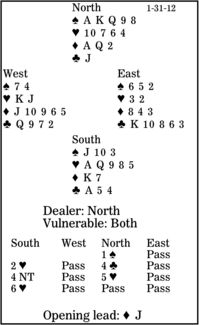Bridge column, January 31: Card play is easy if you peek

Jim Fiebig, an oft-quoted wit, said, "When someone demands blind obedience, you'd be a fool not to peek.
Some players, sadly, cannot resist trying to peek at their opponents' hands. (I always hold my cards under the table, so no one else can see them.)
When you read bridge articles, it is easy to see what would have worked at the table if you peek at all 52 cards -- as in this deal. But without looking, what is the right line of play in six hearts after West leads the diamond jack?
The bidding was modern. Four clubs was a splinter bid, promising four-card heart support, a good hand and a singleton (or void) in clubs. Four no-trump was Roman Key Card Blackwood, the reply showing two key cards (the heart king and an ace, or two aces) and denying the heart queen.
Declarer saw that he could afford one trump loser, but not two. He won with dummy's diamond queen and played a heart to his queen. West took his king and returned a diamond. South won with dummy's ace and called for another trump. When East played the three, declarer took a second finesse to go down one.
South took the wrong percentage play on the second round of hearts, but did not need to guess. He should have taken the first trick in his hand and cashed the heart ace. When the jack dropped, declarer would have driven out the heart king and claimed. But if only low cards appeared, he could have crossed to the dummy and led a heart toward his queen. There would have been no guesswork.
** ** **
COPYRIGHT 2012, UNITED FEATURE SYNDICATE
DISTRIBUTED BY UNIVERSAL UCLICK FOR UFS

